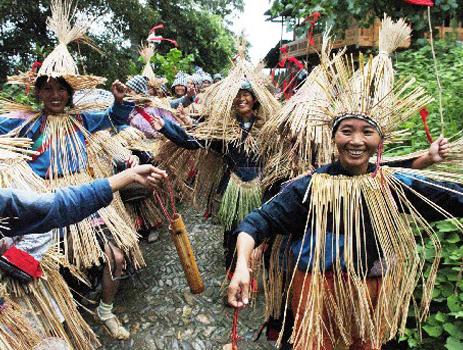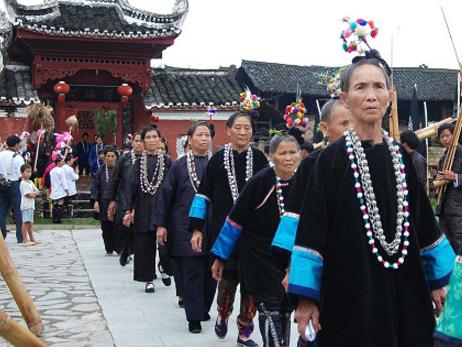
Sama Festival of Dong ethnic group,spreading in Rongjiang County,Liping County,Congjiang County and the surrounding areas inhabited by Dong people,is mainly represented by Chejiang Dong ethnic Sama Festival in Rongjiang County.Sama Festival is the oldest existing traditional festival of Southern Dong,and it is the vestige of the custom in the matriarchal clan society of Dong.
"Sama"is a transliteration of the equivalent in Dong language,and"Sa"means"grandmother"while"ma"means"great",thus"Sama"can be paraphrased to"A Great Grandmother"(the great grandmother is named Sasui).Sama is an avatar of the common ancestors and gods of the whole Dong ethnic group(especially in the southern dialect region).And Sama was also an ancient heroine in the legend,who played an important part in Dong's politics,military affairs,and culture,etc.According to legend,as long ago as in the matriarchal clan society,a valiant and battle-tested chiefess of the Dong ethnic group emerged victorious in every battle and repeatedly achieved wonderful merits in the battles against the enemy's aggression,but unfortunately in a battle she was trapped by foemen as the number of foemen was tens of times of her troop,and at last she died hard.The clansmen highly respected her and regarded her as a goodness that could bring them peace and auspiciousness,so they gave her an honorific title of"Sama".

In order to make sacrifice to Sama,the people built a hillock in the central ground in the stockaded village as an altar and a place of performing sacrifice,and this hillock was called"Ransa"(Dong language,"ran"means house,and"Ransa"means"grandmother's house",which is called"ancestral temple of Sama"or"ancestral temple of the Holy Mother").In some stockaded villages of Dong ethnic group,ancestral temples of Sama were built.In the Reign of Guangxu in the Qing Dynasty,the altars in the open were made over into"Ransama"(Sama House),but it is interesting that there was only a shrine in the house and no God statue there.A large half-opening black umbrella was erected in the shrine and under the umbrella were some stones,which signified Sama and the Dong people's happiness and health under the protection and bless of Sama's spirit.In every first month and second month of the lunar year,a grand fiesta of gigantic and majestic scene would be held at"Ransa",and this practice has been handed down generation after generation and become the present"Sama Festival".




